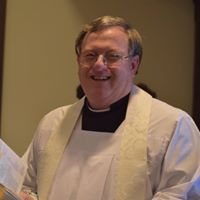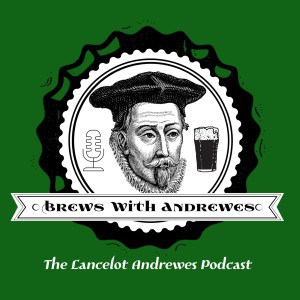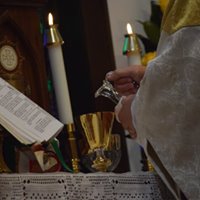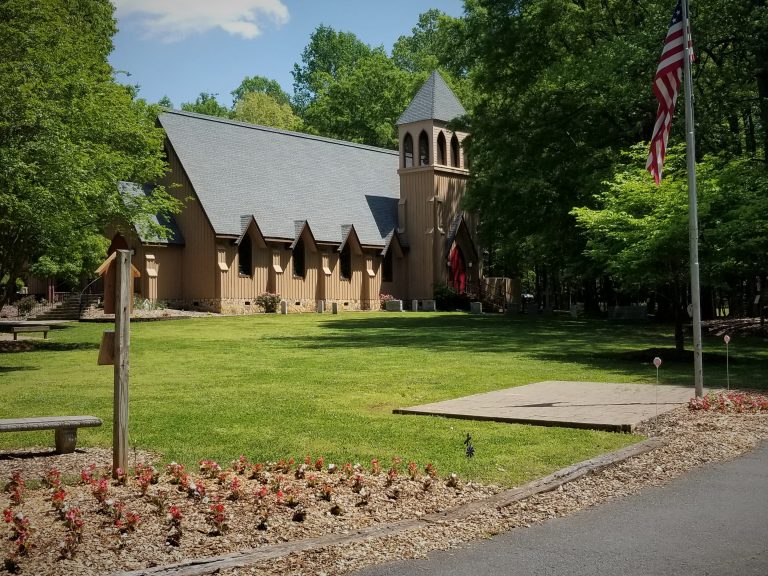Deeper Dive into the Story of the Bible
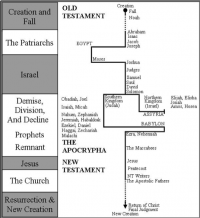 ON THE
ON THE
STORY OF THE BIBLE
The Rev’d. Allen Fisher
Introduction to Salvation History
The Bible records the LORD God’s Mission of Love.
- All of the Bible flows as one Story.
- This story is the account of the Mission of God:
- The story of a loving God creating, redeeming, and restoring a family that reflects His image.
- Without a sense of the whole – God’s overall plan of salvation – it is nearly impossible to understand how all the parts fit together.
God (revealed as Father, Son, and Holy Ghost) is most often seen in the Bible in the Person of the Son as He guarantees the success of this Mission:
- Although no one has ever seen the Father (cf.Jhn.1:18), the Son makes Him known throughout the events recorded in the Scriptures as:
- The Angel of the LORD (Gen.48:14-16; Ex.3:1-6)
- The Presence of the LORD (lit. ”face”; Ex.33:11,14)
- The Word of the LORD (1Sam.3:21; Jer.1:4,6,9)
- The greatest and most complete revelation of the Father by the Son is when the Son takes on human flesh as Jesus.
- This is why Jesus says that all Scripture points to Him (Lk.24:27, 44; Jhn.5:39).
- As Jesus (“the salvation of the LORD”) the Son would save His People (Matt.1:21) completing what He had begun in the OT (Jhn.3:13-15; 12:27).
The story of this mission fills all the pages of the Bible from Genesis to Revelation as I will attempt to show in the pages that follow.
Genesis 1–11, Creation and The Fall(s)
This Story begins with Creation
- The LORD God first created all things visible and invisible by His Word declaring it all to be good.
- The crowning act of Creation came when the LORD God, in the presence of His image bearing angels (Jb.38:6-7), created man and woman in His own image, and He declared them to be very good.
- The LORD God then instructed the man and woman to be fruitful and to grow their human family of imagers so to fill the world and to take dominion over all of creation, while at the same time working and keeping the Garden where they would live in peace and in unity with their God.
- In harmony with God’s Word they would have life, experiencing the blessing of rule and descendants.
Shortly thereafter though we are told of the Fall
- All of creation had come into existence by obeying God’s Word (Ps.33:9), but this good creation would be made subject to corruption as a rebel from the heavenly hosts of angels would lead Adam and Eve to disobey that Word.
- This deceptive serpent deceived them into doubting that God was good and that His Word had their best interests in mind.
- When the man and woman self-servingly acted upon those doubts there were consequences:
- Life → Death;
- Pleasure → Pain;
- Abundance → Toiling for food;
- Perfect harmony → Alienation and conflict.
- Even with their rebellion, God was first to seek out his now fallen people (Gen.3:8-9).
- Then, He began to explain His plans for restoring His people by a “seed of the woman” who would one day crush the works of the devil, and restore humanity from where they had fallen.
While discussed less, there were other serious falls
- Other parts of the human family would likewise be led astray by other fallen angels who would decide to rebel, but each time God would step in to make and to set things right.
- As the offspring of Adam and Eve began to increase and the majority of humanity likewise chose to reject life in harmony with God’s Word, other rebels came from the heavenly hosts offering forbidden wisdom and technology to advance their newly forming civilizations. The LORD God, however, destroyed their influences with the flood (see Gen.6).
- After the flood, humanity again refused to live according to God’s Word, opting instead for their own ingenuity. So, God disinherited all disloyal nations, and chose the one He could work through to produce the promised seed, allotting the others to be governed by other members of the heavenly hosts (Gen.11; Deut.32:8-9)
Genesis 12-50, Promise and Faith
It was clear that he LORD God would not give up on His desire for a family that bore His image and thus He set into motion the next stage of His mission.
- God continued His mission by calling Abraham and promising to make him into a great nation, who would live in the land He would prepare for them and who would bring blessing back to the now disinherited nations of the world.
- In the midst of this we can see in Abraham all that it takes to be a part of the family the LORD God was forming: faith in, and allegiance to being a part of, what God promises to do.
- Also, in this story we see how the LORD also preserved the means for His people to be in communion with Him as the Most High God through the priesthood of Melchizedek.
- After Abraham, God continued working through his descendants: Isaac, Jacob, and Jacob’s sons (Reuben, Simeon, Levi, Judah, Dan, Naphtali, Gad, Asher, Issachar, Zebulun, Joseph, Benjamin).
- In time, these 12 would become the fathers of the 12 Tribes of Israel.
- But first, God would make a way for the family to move to Egypt and grow into the nation as He had promised through Joseph.
Exodus 1-18, Revelation & Redemption
Once a Nation, God delivered His People and began to restore them to their intended purpose.
- There in Egypt, the heavenly hosts who had been placed over it while the LORD God raised up the promised seed through His nation, saw a potential opportunity for power while the LORD’s people were in their land.
- They enslaved His people and began trying to decrease their numbers, but God’s plan, as the God of gods (Deut.10:17) would not be thwarted.
- The LORD God intervened on behalf of His people:
- He came to Moses as the Angel of the LORD revealing Himself and His plan to deliver His people from slavery by going to war against Egypt’s gods and bringing them out to fulfill their role of being a blessing to His Creation.
- God ultimately liberated His people from their slavery under Egypt’s gods through 10 battles climaxing in the Passover, and delivered them from Pharaoh and his armies shortly thereafter by flooding them by the sea.
Exodus 19-24, Covenant and Law
After saving His people from their slavery, God delivered them to Himself.
- At Mt. Sinai God solidified the new nation by entering into a covenant-treaty with them, as a redeemed people, in which they would commit themselves to be loyally obedient to the LORD.
- This new nation would be a priesthood to the nations (Ex.19:4-6), as Adam and Eve were for Creation, and Melchizedek was for Abraham.
Exodus25 – Leviticus – Numbers 10:10
Divine Presence and Holy Living
In order to be a priesthood to the nations they would need access to the LORD God, which He would graciously provide for them.
- God revealed both His desire to dwell in their midst and the instructions for making it possible.
- The Tabernacle became the place for the fiery Presence of the LORD to dwell, where He would rule over, lead, and provide for His people.
- As a holy God among an unholy people, the LORD also revealed a sacrificial system for maintaining sacred space, as well as stipulations for how to live a holy life as a redeemed, loyal people in a relationship with their covenantal LORD.
- It was becoming clear that God, Who is inherently holy, would always make a way for His sinful people to be able to relate to Him in every aspect of their lives no matter the sin.
Numbers 10:11 – Deuteronomy 34
The Land and Covenant Renewal
Even though the LORD God was always true to His people, His people were not always true to Him.
- The first generation of those saved from Egypt were not true to the LORD, instead they simply turned to new gods who were dwelling in the new land at the time (Deut.32:16-17).
- Despite the disobedience of the first generation to participate in God’s promise and plans, He did keep His Word and brought them to the edge of the Promised Land.
- The LORD then provided covenant renewal for the new generation, in preparation for entering and living in the Land, where they would dwell under the blessings and curses of the covenant treaty.
Joshua, Judges, and Ruth,
Possessing the Promises in the Land
God established His people in the Promised Land and delivered them from ongoing threats.
- God led His people into the Promised Land personally as the Angel of the LORD and by appointing the leader Joshua to lead His people in the Conquest of Canaan.
- Together they would cleanse the land of all the rebel gods, their giant offspring, and their cultural influences over the peoples they ruled.
- Outside spiritual forces were not the only threats to His people’s faithfulness, so the LORD raised up Judges to overcome the consequences of their inner failings.
- Through these appointed, but less than perfect “saviors,” God graciously overcame His people’s repeated threats of disobedience and prepared the way for the rise of an upright King (as can be seen in the story of Ruth).
- Part of their threats came from the fact Israel did not obey God in removing all inhabitants of the land, and subsequently they constantly fell into the lifestyles of those people groups.
1&2 Samuel, 1Kings 1-11, 1Chronicles – 2Chronicles 1-9, God’s Royal Rule
Part of God’s initial plan for His people was to have a king to rule in His place (Deut.17).
- Though God’s people asked with the wrong motive of being like other nations, a king was given.
- The last of the Judges, Samuel, anointed the first king of Israel, Saul.
- Through the kings, God established His rule in the earth by establishing Zion (Jerusalem) and by the exclusive covenant He made with King David (the second King) and his descendants (2Sam.7:13-16).
- God then blessed David’s son, Solomon, with wisdom and wealth and allowed him to fulfill his father’s wish to build a permanent place to worship the LORD in Jerusalem (1Kngs.5-8).
- This would provide a place for Israel and all the nations to know and submit to the LORD’s rule through the mediatory roles of a Davidic Kingship and a Holy Temple.
- Conversely, Solomon’s idolatrous behavior led to a disobedient regime (1Kngs.11), which led to God bringing judgment against Israel.
Psalms, Proverbs, Ecclesiastes, Job,
The Life of Faith Under God’s Rule
[Tobit, Wisdom, Ecclesiasticus]
Psalms show that the LORD’s redemptive rule required His people to respond in giving praise to God and in submitting to His “anointed” ruler in the Earth.
- Part of God’s mission of fashioning a people for Himself was that those people would love and obey Him, and would express and nourish their corporate life in gathered worship.
- These five books of collected psalms contain and exemplify the appropriate prayers and praises to be offered to God.
Proverbs show that God’s redemptive rule also required a faithful people to live according to the “fear of the LORD,” which meant submission and worship.
- This is the “beginning of knowledge,” that is, a proper orientation toward creation and the ups and downs of life.
- God grants “wisdom” (skill) to live uprightly within the proper order of things.
Job and Ecclesiastes show that the recognition of God as Creator, Redeemer, and Sustainer also means living in the tension of God’s rule in and over a fallen world.
- Despite the mysteries of sin, suffering, and death, God’s people must trust in the goodness and ultimate justice of the LORD’s rule.
In the Apocryphal Books dealing with the life of faith:
- Tobit shows the importance of the family values first taught in Deuteronomy for God’s people;
- Wisdom of Solomon shows us more fully the benefits, nature and role of God’s Wisdom in history; and
- Ecclesiasticus offers much practical advice for everyday experiences and gives further understanding of the role of the Wisdom of God.
1Kings12-22, 2Kings, 2Chronicles10-36
Demise, Division, and Decline
As mentioned, God would not tolerate the threat of His Nation’s idolatry and thus ultimately invoked the curses provided for in the Sinai Covenant.
- The prophets, beginning with Moses, had forewarned of the nation’s demise if it were to ever choose continued disobedience to the LORD.
- The LORD would use foreign powers to bring judgment against His people, which would ultimately lead to its downfall and exile.
- A succession of steps across three and a half centuries led to the destruction of the Northern parts and the exile of the Southern parts of Israel.
- A schism incited by Solomon’s son Rehoboam divided the nation into the Northern State of Israel and the Southern State of Judah (1Kng.12).
- The Northern State of Israel persisted in idolatry, immorality, and social injustice, which resulted in God sending the foreign power of the Assyrians to destroy it (2Kng.17).
- The Southern State of Judah, despite its wickedness, survived for a season, but it fell under the judgment of the Babylonians culminating in The Exile of the king and his people (2Kng.25).
- The Prayer of Manasseh comes from one of the Southern Kings (2Chr.33:12-13,18-19).
Isaiah, Jeremiah, Lamentations, Ezekiel, Daniel, Hosea, Joel, Amos, Obadiah, Jonah, Micha, Nahum, Habakkuk, Zephaniah,
The Time of the Prophets
[Judith, Baruch, Three Children, Susanna, Bel and the Dragon]
God raised up prophets to both cite all the specific covenant violations of His people and to offer hope.
- The LORD raised up many prophets reminding His people that He was a loyal covenant Keeper Who was administering the covenant curses that His people had brought upon themselves.
- Due to their insistent and incessant disobedience, He was destroying the nation’s ruling bureaucracy and Temple, and dispersing the populace amongst the Gentile (unbelieving) nations.
- The LORD also raised up the prophets to give his people hope by having them speak of distant future events, which would bring about God’s long promised plan of salvation.
- God was going to provide for a restored “remnant” to the land based upon a New Covenant enacted through a Davidic descendant and Suffering Servant.
- The new land, however, was but part of a whole newly created order which would culminate in the “new heavens and new earth.”
Ezra, Nehemiah, Haggai, Zechariah, Malachi, Return and Restoration
[1&2 Esdras, 1&2 Maccabees]
The Exile would not be the end for God’s people; the LORD still fully intended to keep His promise to Abraham by forming a nation out of his descendants to bring blessing to all of the world.
- Just as the LORD had judged His people with foreign powers, so He would ensure their return by the foreign powers led by Cyrus the Great.
- Cyrus ended the Babylonian Captivity of God’s people and initiated their “return,” which the prophets had spoken about earlier.
- Zerubbabel, Ezra, and Nehemiah, led God’s people back to Jerusalem where they tried to restore things back to the way they had been before. But one thing became sorrowfully clear and that was the fact that their Exile had only partially ended:
- Only the Southern State had been brought back into the Land (a far cry from “all Israel” as spoken of by the prophets, Jer.30:1-38:22)
- The LORD God did not return to nor reside in the Temple once it was rebuilt (the Holy of Holies remained empty).
- The people remained under the control of the Persians, then the Greeks, and then finally the Romans.
- God was still very engaged in the well-being of His people as can be seen in the stories recorded in the Maccabees, but this was not the time when God would fulfill all His promises
- After returning from their Babylonian Captivity, God raised up more prophets like Haggai, Zechariah, Malachi, and Esdras who addressed the continued sins among the returnees and pointed out the incomplete promises of a new idyllic world.
- They realized and proclaimed that the LORD God was not through with His people.
- They explained to the community that they were the beginning of a progressive establishment of God’s new Kingdom.
Matthew, Mark, Luke, John,
The Kingdom of God is Established
In the fullness of time, the LORD God acted definitively to finish what He had begun by bringing His people back into the Land as He became one of them in the form of man as Jesus.
- The LORD, as Jesus, came into the world as its long-awaited Messianic King in the line of David, fulfilling the Old Testament promises He had made
- The LORD, by entering the world through the womb of the Virgin Mary, came into the world as the long-awaited “seed of the woman” come to destroy and undo the works of devilish Serpent.
- The LORD, by coming in human flesh, came into the world as the long-awaited means by which the Father could begin walking amongst His people in fellowship with them.
- As fully God, Jesus the Christ was the Presence of God on the earth where His people could meet with Him face to face like Moses. Unlike the rebuilt Temple in Jerusalem, God fully dwelt within Jesus’ Body becoming the perfect meeting place between God and His people.
- As fully man, Jesus the Christ, upon His death, burial, and resurrection embodies the new humanity made into the image of God as the new Israel of God.
- As Jesus, the LORD God Himself became the regenerator of the created order and restorer of the ideal Kingdom of God on earth.
- All that was lost (and more) was reclaimed in the person of Christ and all that was foreshadowed by the prophets, priests, and kings was realized in Him.
- Further, once and for all, He cleansed the land of all demonic remnants of the rebel gods, delegitimized all the spiritual beings who had unfaithfully ruled over the nations of the earth, and commissioned a new nation to make His blessing realized throughout all the earth.
Acts of the Apostles,
God’s Spirit Breathed into His New People
As the perfect Prophet, Priest, and King in Jesus, the LORD ascended to the heavenly place of power to ensure and establish God’s Kingdom rule upon all the earth.
- After His Ascension, Jesus sent His Holy Spirit on Pentecost, finally ending His people’s Exile and empowering the Apostles to be His witnesses for spreading the message of His Gospel to the ends of the Earth.
- As people from every nation responded to the promises revealed in Jesus’ Gospel by having faith in them and allegiantly participating in their fulfilment, God’s Kingdom among the nations began to be increasingly realized.
- A unique relationship between God and His people, not known in earlier times, became achieved by the Baptism of the Holy Spirit in which believers would be regenerated, indwelt, and empowered to be God’s agents of blessing.
The New Testament Epistles,
The New Creation in the Church
[The Apostolic Fathers]
The NT Epistles then showed the nations how to benefit from the Past, Present, and Future realities of the redemptive rule of the LORD God in Jesus.
- A Past Reality – Accomplished historically, the salvation God offered through the work of Jesus is definitive, unshakable, and can be objectively applied to all who have faith in the promises of the His Gospel.
- A Present Reality – By faith in that objective reality each believer can begin to participate in the redemptive rule of God as it is progressively realized in their own thoughts, words, and deeds, the Church they belong to, and the created order.
- A Future Reality – Both the past, positional reality and the present, experienced reality of the believer have their culmination in the promised, future reality of the full, complete regeneration of the believer, the Church, and the Creation.
- The salvation objectively-applied and subjectively-experienced will culminate into the fully-glorified salvation attained at the Second Coming of Jesus Christ.
- At His return, believers will receive resurrected, glorified bodies and the created order will be transformed into the long-promised New Heavens and New Earth where the LORD God will live eternally with the family He had set out to create in the first pages of the Bible’s Story.


